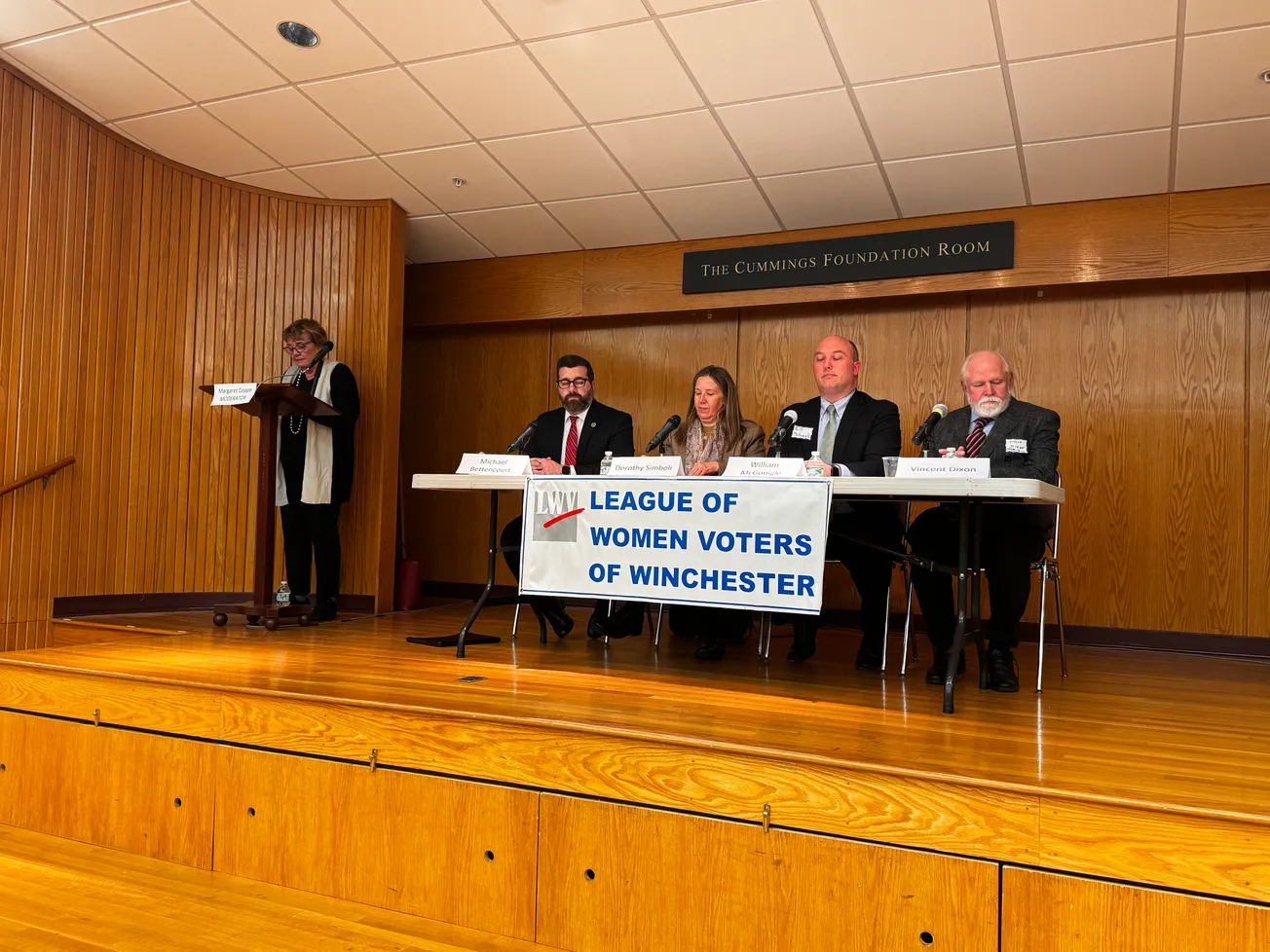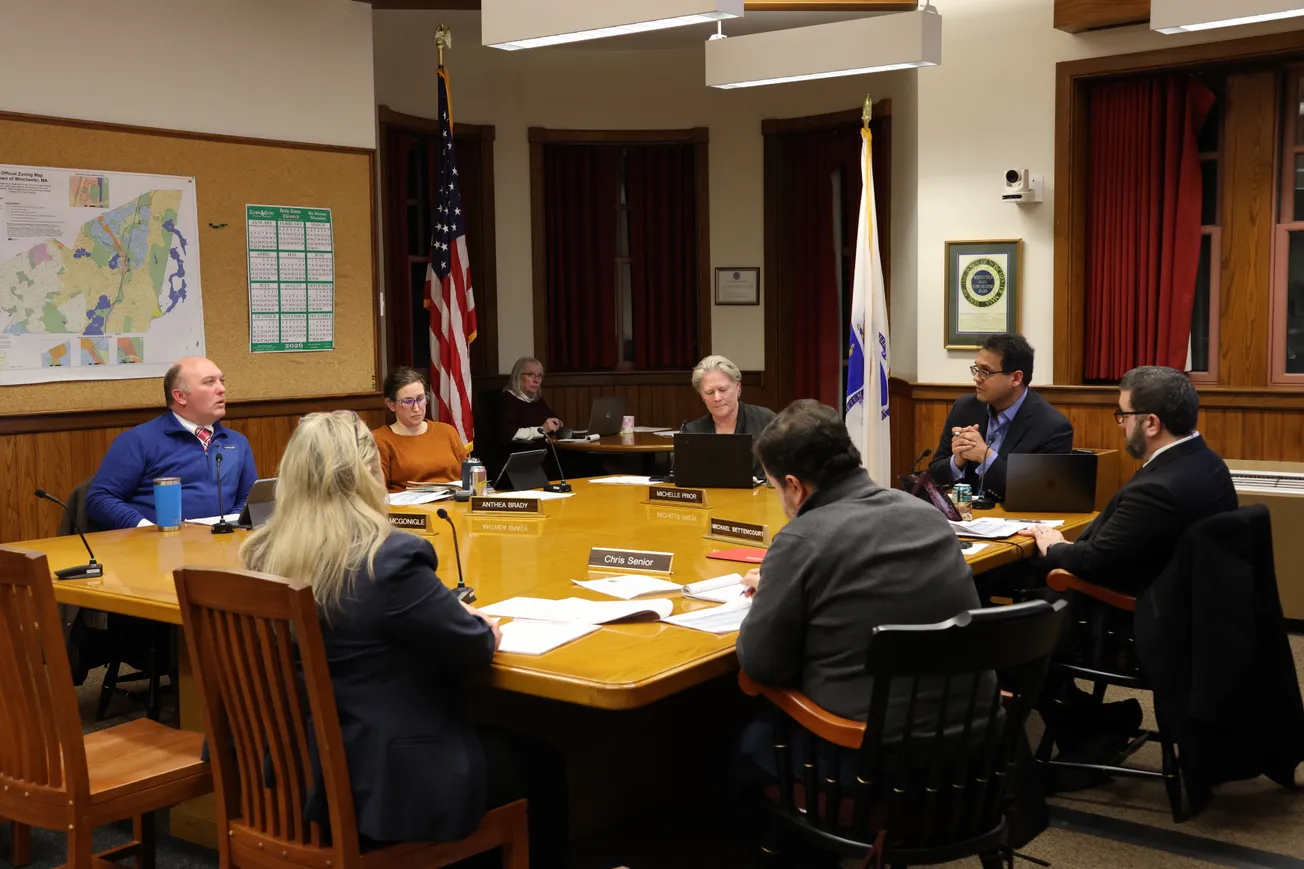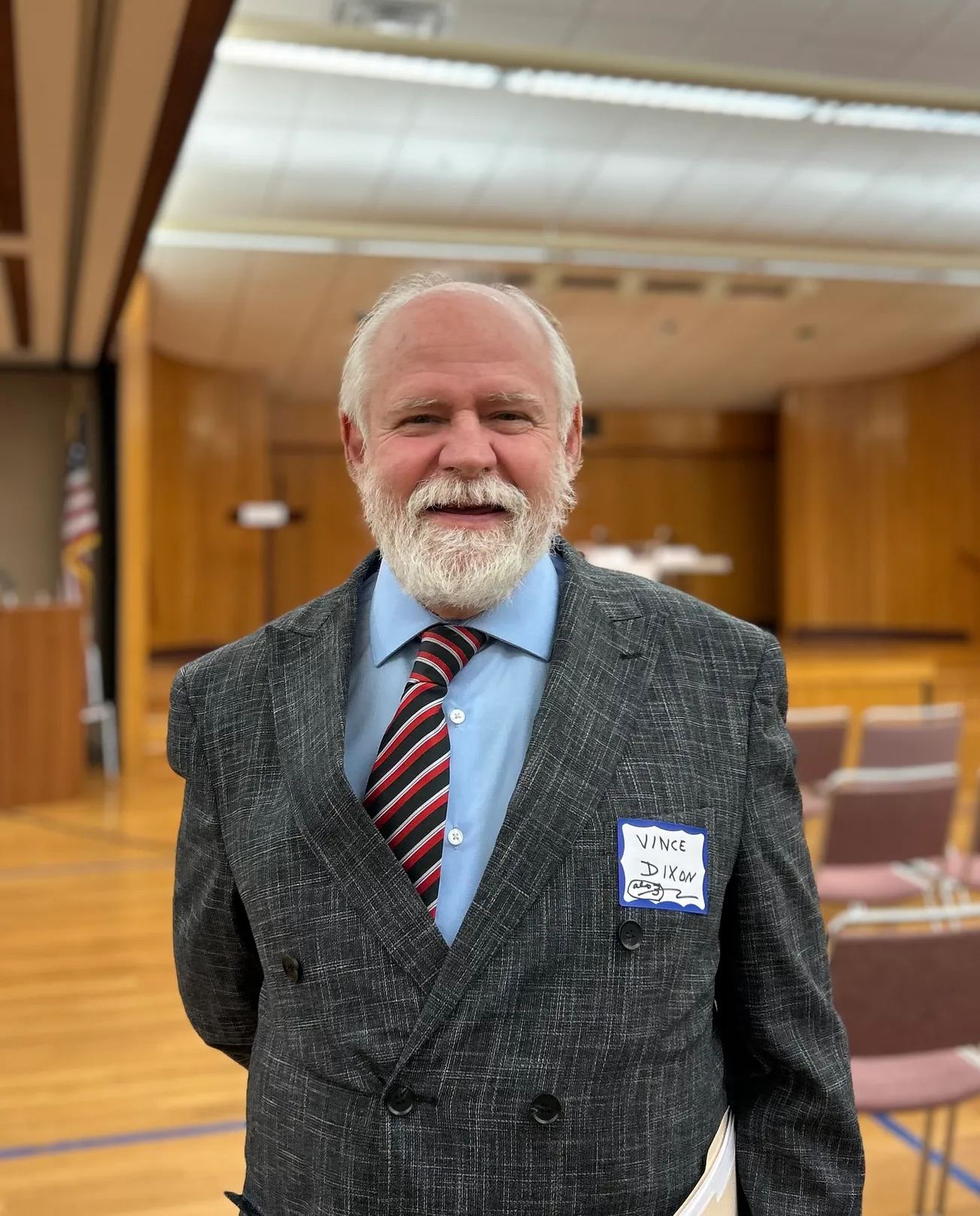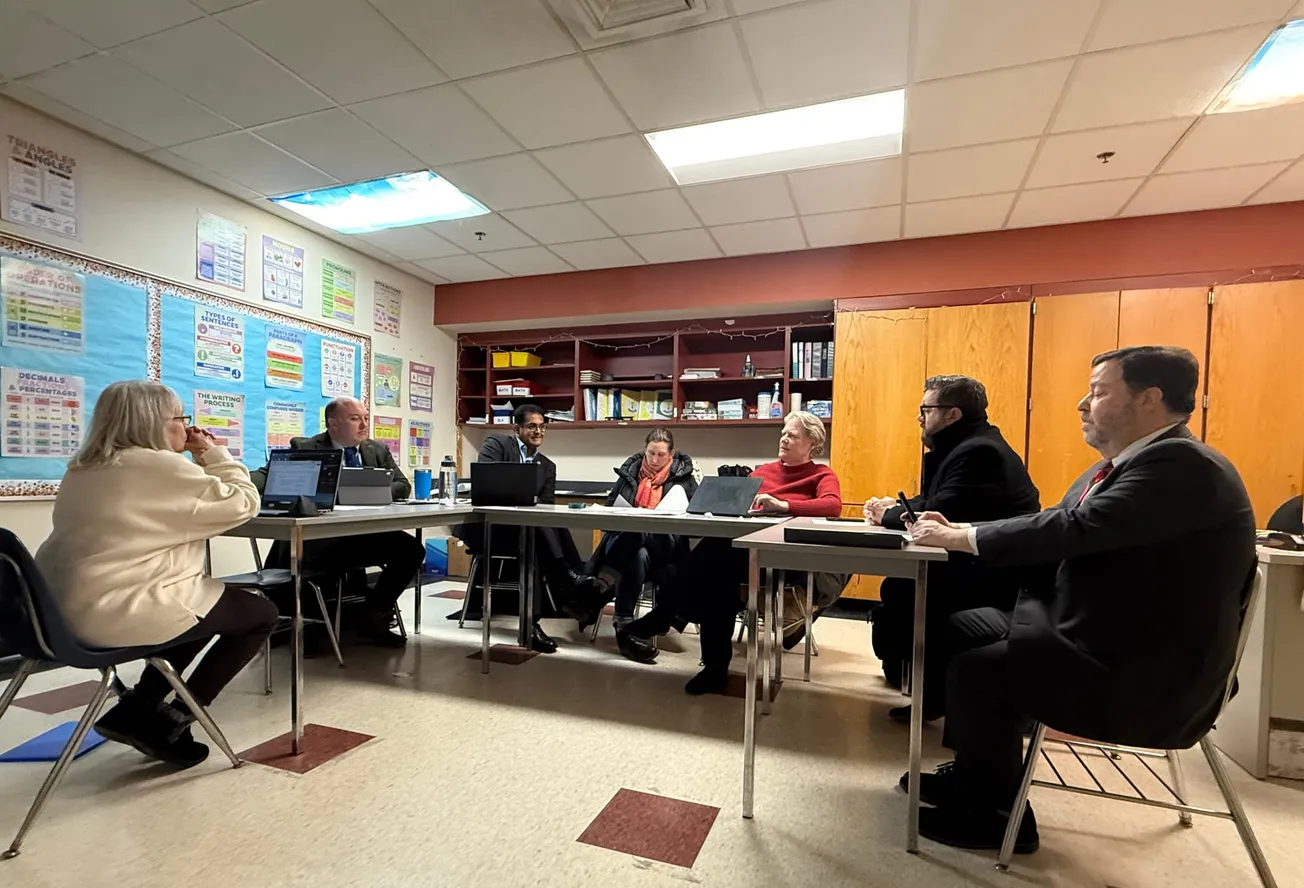Table of Contents
The four candidates vying for the two three-year seats on the Winchester Select Board disagreed very little at a public forum hosted by the Winchester League of Women Voters on March 7, as the evening unfolded as more of a cordial discussion among individuals who shared similar perspectives on the issues facing the town.
The hour-long forum covered a lot of ground from ways to cultivating civility, and addressing the town’s stretched finances to weighing in on the MBTA 3A zoning proposal and adoption of the Community Preservation Act.
With Winchester facing a $1.8 million structural deficit in its projected $156 million budget in fiscal year 2025, incumbent and attorney Michael Bettencourt addressed the long-term approach to the structural deficit.
Town Manager Beth Rudolph warned that the structural-deficit gap is expected to widen over the next three years if ignored.
To cover the deficit in next year’s budget proposal, her budget leans heavily on $1.89 million from its free cash reserves—an approach the Select Board adopted in a 2010 policy as a last resort given limited new growth and Proposition 2 1/2 caps.
Bettencourt stressed the importance of making difficult decisions about priorities while maintaining the town's AAA bond rating, which keeps borrowing costs down.
“We can't just go from here to here,” he said. “There needs to be at least a five-year plan moving forward.”
Attorney and candidate Dorothy Simboli, a Town Meeting member and Board of Appeals member, advocated for establishing bylaws and guardrails around the town's building and capital stabilization funds to ensure proper management of these resources.
“Over time, both building and capital stabilization have been used to slap Band-Aids on things whenever we just need money,” she said. “We need to think clearly about that and exercise fiscal prudence.”
Candidate Bill McGonigle, also a lawyer, stressed the importance of collaboration and communication in addressing the town's financial challenges.
“If we’re going to be successful, we’re going to have to work together to determine short- and long-term solutions,” he said. “We have to be creative, and we have to look for opportunities to collaborate to actually make sure that they happen.”
Candidate Vince Dixon, a historian and educator who has served on various boards and committees in Boston, Cambridge and Winchester, proposed creating a new revenues committee to study and make recommendations.
To CPA, or not CPA?
All enthusiastically supported local adoption of the CPA, which will appear on the Town Meeting warrant in April. If passed on the Town Meeting floor, it will go to a referendum in November.
If accepted by local voters, the CPA would add a surcharge of up to 3% (Bettencourt said the town aims for a 1.5% surcharge) on local property tax bills, a mechanism not designed to increase the tax rate but to assess a surcharge on property tax bills after they are calculated.
This surcharge feeds into a local Community Preservation Fund, which is then bolstered by annual matching funds from a statewide Community Preservation Trust Fund, into which a certain percentage of the money from the Registry of Deeds goes.
Through the CPA, Winchester could generate $2 million and can fund projects in open space preservation, historic preservation, community housing and recreational use.
“The CPA is necessary for us to create a strategic plan for the future and benefit of the town,” Bettencourt said. “It’s hard for us to make decisions between a business failing and a playground that needs to be done. The CPA will help us continue with our priorities to keep the town healthy, safe and active.”
McGonigle called the CPA a “wonderful funding opportunity” and said he wants to ensure that the committee determining how the money is spent has perspectives from experts in capital planning, the town manager’s office and the Finance Committee.
Capital planning
When asked about the roles of the Finance Committee and Capital Planning Committee in establishing a capital plan for the town, the candidates agreed that both committees play essential roles and should have seats at the table.
Candidates highlighted the importance of the Capital Improvement Program and the collaborative relationship between the Finance Committee, Capital Planning Committee and town manager.
Simboli and McGonigle agreed that both committees should have seats at the table and play essential roles in establishing a capital plan for the town.
“The town needs to come up with a long-term game plan as to what things need to be replaced, how long they can last, and when we do a new replacement of something, we need to have an idea about what the time frame is on what we’re going to be looking to replace that item,” Simboli said.
MBTA 3A zoning
Winchester’s MBTA zoning proposals emerged as the key issue. The state law requires communities served by the MBTA, like Winchester, to provide at least one reasonably sized zoning district that allows multi-family housing within walking distance of a commuter rail station.
Simboli expressed general support for the extensive work done by the Planning Board and town planner on Winchester’s proposal to comply with the law.
“I know that they’ve attempted to include senior housing. They've attempted to include a 10% affordable housing. And they’ve attempted to make mixed-use structures,” she noted, adding she wished it could include more affordable and senior housing. “We have the ability to do that.”
Bettencourt plans to vote in favor of the zoning proposal as a Town Meeting member, viewing it as an important step for Winchester as a good partner with the state. His only concern was wishing it included even more affordable housing, like some other communities have done, but he believes the extensive process involving stakeholders and experts should be supported.
“Transportation on the public side is a great way to help people that are low income as well move to our community and we can provide the housing for them,” Bettencourt said. “Being a partner with the state, it's an obligation that we have to support the 3A zoning that’s been proposed by the Planning Board.”
Cultivating civility
The candidates also discussed the importance of promoting civility in public conversations.
“The School Committee does a great job,” Bettencourt said. “They have kind of a code of conduct and standards by which they run their meetings and how they engage with each other. I think that all forms of community should adopt something like that.”
Dixon emphasized the importance of civics education and understanding the Constitution as the operating manual of government.
“Civics is the operating manual of government that people need to know more about,” said Dixon “And we need people to understand [civics] better.”
McGonigle underscored leading by example and having patience to listen to residents’ concerns, even if they don’t fully grasp the complexities faced by the town.
“If we want civility, we have to be civil,” he said. “It starts with each of us, and I guarantee you I will adhere to that.”
Next round of debates
On March 14, there will again be a chance to informally meet Town Meeting candidates from 6:30-7 p.m. Then from 7-7:30 p.m., the two candidates for Winchester Housing Authority will debate. Finally, from 7:30-8:30 p.m., candidates running for two open seats on the School Committee will participate in a debate.
The annual town election in Winchester will take place on March 26, with polls open from 7 a.m. to 8 p.m. All precincts will vote at the Winchester High School Gymnasium, located at 80 Skillings Road.
Winchester News is supported by our community. Please donate to support our work.







